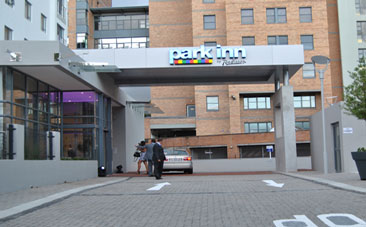SA offers incentives for hotels to retrofit for disabled
By Lorraine Kearney
8 December 2014
A day after the UN's International Day of Persons with Disabilities, an innovative and
unique hotel was opened in Cape Town – Park Inn Newlands.
The 122-bedroomed, mid-market, three-star hotel is designed and built for universal
accessibility for disabled people, and a third of staff members is deaf. The hotel is also
40% owned by DeafSA, which has its offices on the first floor.
The balance is evenly split between the Industrial Development Corporation (IDC),
which funded construction, and Meridian Property Holdings, a Cape Town developer. It is
operated under the Radisson brand by international hotelier Rezidor.
DeafSA has about 800 000 hearing impaired members countrywide. For it, the hotel is a
key broad-based empowerment initiative that has created income generating, skills
transfer and employment opportunities for its members. As a shareholder, it will mean
the NGO is less reliant on donor
funding.
Speaking on the sidelines of the opening on the night of 4 December, Tourism Minister
Derek Hanekom called Park Inn Newlands a "shining example of what is possible" and
"an inspiration".
"We will be announcing a programme early next year to give incentives to product
owners to retrofit their establishments. Will be starting modestly, targeting only graded
establishments, because we will be piloting not only for universal accessibility for
disability, but also retrofitting for energy efficiency."
Raising the bar
"It is a hotel where 30% of the staff is deaf. This kind of raises the bar altogether. It
sets kind a new standard, if you'd like," he said. "It also speaks wonderfully of our
tourism sector and adds to the awards we won for responsible tourism at the World
Travel Market in London about a month ago.
"It is a real shining example of responsible tourism and inclusion, ensuring not only that
there is community
inclusion but that [the deaf community has] real ownership of the
hotel."
Starting on a pilot basis, his department's incentive programme would support
retrofitting of establishments through modest redesign, beginning with assessments of
needs.
"We have done some of that already, doing a needs assessment of 187 graded
establishments in Cape Town and Durban. Of these, 15 were not even compliant with
grading requirements. So we must be aware that some establishments don't have the
cash flow to do this retrofitting."
Incremental
The pilot phase would show what was possible. "We have approximately 6 000 graded
establishments and we can't reach all of these at once. We have to tailor our
programmes to incrementally reach the goal of more efficient energy use and better
design. We will announce a more detailed programme in the next two months."
Regarding energy efficiency, the incentive programme would begin in the
accommodation sector. "There will be an element of self-selection, if you'd like – serious
people who do the right things. Over time, we hope that it will be clearly demonstrably
that it makes sense on the economic front."
Regarding universal accessibility, it would extend to other tourism products. "We will, for
example, train tour guides in sign language. At the moment we are trying to enhance
our tourism offerings and make sure that people with disabilities can enjoy what our
country has to offer," Hanekom said.
It would also offer sustainable employment for disabled people. "There are over a million
people in South Africa who are extremely hard of hearing or deaf," said Hanekom.
"These people can be described as having a disability; of course, it poses challenges but
it ought to be a really limited challenge. There is not a lot I can do that a deaf person
can't do.
Pride
"Deaf people could be our leading scientists,
engineers, hotel managers, even our
minister of tourism. There is very little that deaf people cannot do, and this project
demonstrates this in very real terms.
"In truth, we must express our pride in what so many people have done to make this
project a reality. We must applaud the many people at DeafSA who said, 'we can do it',
and did something that has not been done
anywhere in the world."
His department would showcase the hotel worldwide "because it is inspirational. But it is
terribly important that it should be a success story, and a sustainable success story.
Because that's when you say five years later that not only did they do the right things,
but they achieved great success when they did the right things."
Park Inn Newlands is built on the premises of the old Bastion of the Deaf, a landmark for
the deaf community and the Cape Town offices of DeafSA. The hotel is a landmark
project that has been designed to cater for the needs of all
disabled people. It welcomed
its first guests on 13 October, and in the first six weeks of trading has exceeded
projections. It has a staff complement of 92, of whom 28 are deaf.
It is close to several sport stadiums and institutions, such as Newlands Cricket Ground,
Newlands Rugby Stadium, South African Rugby Union headquarters and the Sports
Science Institute of South Africa. The University of Cape Town is only a short distance
away, as are many office parks and company headquarters.
 Park Inn Newlands, designed with universal access for disabled people, is a world leader. (Image: Lorraine Kearney)
Park Inn Newlands, designed with universal access for disabled people, is a world leader. (Image: Lorraine Kearney)




